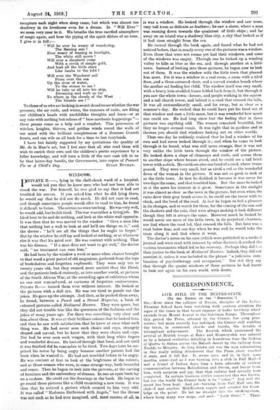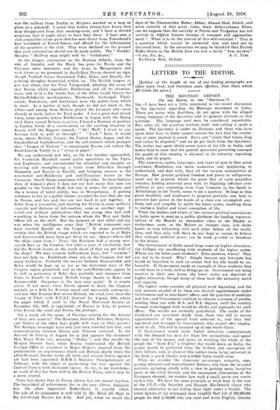CORRESPONDENCE.
LIFE STILL IN TILE BUFFER-STATE.
(To THE Ennui, OP THZ " SPECT8T011...]
Sui,—Ever since the collapse of Russia, disciples of the Indian Frontier School have been watching with anxious attention the signs of the times in that broad expanse of buffer territory whicl extends from Mount Ararat to the Suleiman Range. Throughout this period the Press, attuned by the Censor, has sung pian- issimo; but more recently has indulged, the Censor still wielding the baton, in occasional chords and bursts, the heralds of triumphant achievement. The flourish which announced the arrival of British troops at Baku and Krasnoyodsk was ushered in by a belated recitativo detailing in humdrum tone the linking of Quetta to Sistan across the Baluch desert by the railway from Nushki to Mirjawa. So long drawn out was the note culminating in this really telling denotiment that the Press choir reached it stale, and it fell flat. It seems ages, and is, in fact, some months, since—just as I was turning into a club in Pall Mall—I met a friend of Indian days, long a keen advocate of railway communication between Baluchistan and Persia, and learnt from him, with surprise and joy, that that railway had actually been completed. In certain business circles concerned this was known, but for the world the Censor bade it be " taboo." And well the secret has been kept. And yet—turning from Pall Mall into the club—I met another Mid-Eastern expert and sounded his know- ledge on the point. He led me straight into the smoking-room, where hung many war maps, and said: " Look there! " There
was the railway from Nushki to Mirjawa marked on a map as plain as a pikestaff. I noted that within twenty-four hours that map disappeared from that smoking-room, and I have a shrewd suspicion that it ought never to have been there. I have seen a dub committee refuse good sketches sent direct from Townehend's first battlefield of Kut-el-Amara and offered for the information of the members of the club. They were declined on the ground that such information should not be made public. The " Nushki- Mirjawa " Railway map might well be " withdrawn."
As the danger, consequent on the Russian debacle, from the side of Anatolia and the Black Sea grew for Persia and the Caucasus more imminent, and the Army in Mesopotamia and such forces as we possessed in South-East Persia showed no sign, though Turkish forces threatened Tiflis, Baku, and Enzelli, dis- quieting thoughts fermented within us. The British tongue or hen was silent, but Sir Paul Vinogradoff, pleading the cause of that Russia which repudiates Bolshevism and all its abomina- tions, told us in a few words that, if the Allies would thwart the Berlin-Bolshevist machinations, Murmansk, Archangel, Vladi- vostok, Manchuria, and Azerbaijan were the points from which to start. As a matter of fact, though we did not know it, the Allies—and among them Britain played the foremost role—were already at work, before Sir Paul spoke. I was a good deal struck when, some months before Bolshevism in league with the Drang each Osten roused Britain to action, I heard a Russian of position in London break off a conversation on the existing situation in Russia with the flippant remark : " Ali! Well! I trust to our Russian luck to pull us through! " "Luck " here, it would seem, means Britain, France, the United States, Japan, and the Czecho-Slovak Confederation, and the self-interest which prompts that "League of Nations " to emancipate Russia and reduce the Brest-Litovsk Treaty to a " strap of paper."
We can understand now ally, as the hot weather approached, Sir Frederick Marshall ceased active operations on the Tigris and Euphrates, and concentrated his attention and energies on securing and strengthening a front from Klianikin through HamadAn and Kazvin to Enzelli, and bringing succour to the sore-tested anti-Bolshevist and anti-Turanian forces in the Caucasus. Small things sometimes tell big tales. In these halcyon days of woman's glory I dare not say how many fair ones are graded on the General Staff; but one, it seems, for certain, and she a woman of noted ability, was in Mesopotamia. A passing reference to her at a public dinner revealed the fact that she was in I'ersia, and two and two are not hard to put together. A letter from a journalist, just starting for Persia in some military capacity and desirous of information, came as another sign. I noted—not without satisfaction—that the young idea had still something to learn from the veteran whom the War and India slffices left on the shelf. But the moment of real relief and joy was when the intelligence came that "British armoured cars have reached Enzelli on the Caspian." It seems practically certain that the British troops which are reported to be at Baku and Krasnovodsk must have got there by sea. Query—where did the ships come from ? True! the Russians had a strong mer- cantile fleet on the Caspian, but after a year of revolution, how did the British forces on the south shore of that sea get hold of the ships? We may surmise half-a-dozen ways, but "surmise" does not help us. Roadsteads there are en the Caspian, but not many harbours. Probably the service between Krasnovodsk and Baku would be kept up as far as the disturbed state of the Caspian region permitted, and as the anti-Bolshevists appear to be still in possession of Baku they probably sent steamers from Baku to Enzelli to convey British troops thence to Baku and Krasnovodsk. Sea-power to the fore once again! It is ninety years, if not more, since Persia agreed to leave the Caspian entirely as a field for Russian naval and mercantile enterprise; and now that Russian fleet serves Britain, the rival, ever since the Treaty of Tilsit (ride Journal for August, 1918, where the paper which I read to the Royal Historical Society on December 7th, 1917, is reprinted), of Russia in Asia, to protect alike Russia the rival and Persia the protegee.
Not a word, all the same, of Persians arming for the defence of their own country! The Rustams, Sohrabs, Bahrams, Shdpurs, and Nadirs of the olden days might well turn in their graves!
The Kashgai seemingly have only just been wheeled into line, and communication between Shiraz and Teheran restored. In the Journal de Geneve of August 1st or 2nd appears the statement
that Major Stoke (sic, meaning " Stokes "; and this recalls the Morgan Shuster days, when Russia constrained the British
Foreign Office to acquiesce in Major Stokes's removal from the gendarmerie, an acquiescence which cost Britain dearly when the phi/o-Teutonic Swedes broke all faith and stirred Persia against Us) had been appointed II.B.M.'s Minister Plenipotentiary at Teheran, with the object of prosecuting the war against the Central Powers with increased vigour. So far, to my knowledge, no word of this has been said in the British Press, and it may be a mere canard.
Time has shown that in Persia silence has not meant inaction. The beau-ideal of achievement lies in the very silence. Afghanis- tan, the other important Buffer-State, is equally silent. The tale of its quiescence is well told by Mr. Ikbal Ali Shah in the Edinburgh Review for July. And yet, when we recall the days of the Ghaznavides, Baber, Akbar, Ahmed Shah Abdali, and more recently of that great ruler, Amir Abdurrahman Khan. can we suppose that the anarchy of Persia and Turkestan has not revived in Afghan breasts dreams of conquest and aggrandise- ment ? What is to be the reward of this self-restraint ? That is a question which cannot be answered now and need not be discussed here. In the meantime we may be thankful that British Buffer-States in the Middle East are now a fairly " firm market."



























 Previous page
Previous page